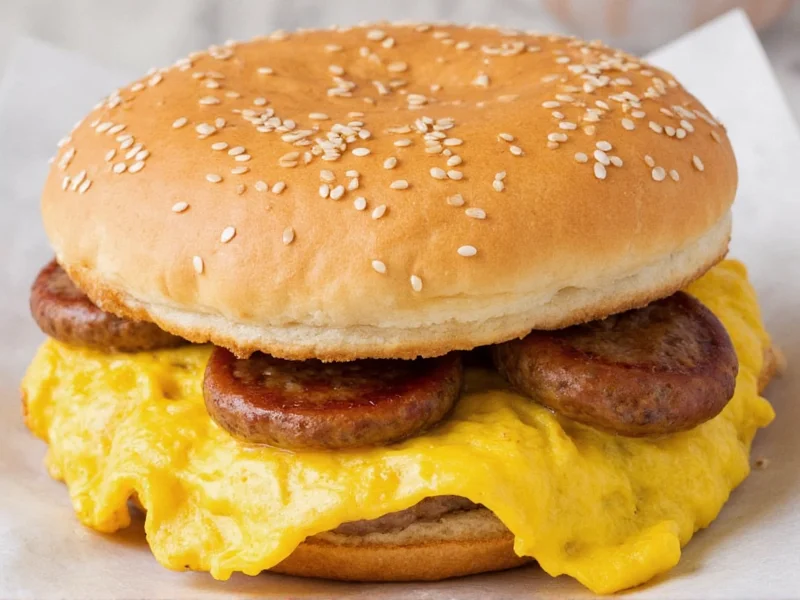Understanding the nutritional profile of fast food breakfast options is essential for making informed dietary choices. The Sausage and Egg McMuffin represents one of McDonald's heartier morning offerings, and its calorie count reflects the substantial ingredients that make up this menu item.
Nutritional Breakdown of the Sausage and Egg McMuffin
While calories provide a basic measure of energy content, examining the full nutritional profile gives a more complete picture of what you're consuming. The Sausage and Egg McMuffin contains several key nutritional components that contribute to its overall dietary impact.
| Nutrient | Amount | % Daily Value* |
|---|---|---|
| Calories | 480 | 24% |
| Total Fat | 32g | 41% |
| Saturated Fat | 12g | 60% |
| Trans Fat | 0.5g | - |
| Cholesterol | 240mg | 80% |
| Sodium | 1090mg | 48% |
| Total Carbohydrates | 29g | 11% |
| Dietary Fiber | 2g | 7% |
| Sugars | 2g | - |
| Protein | 23g | - |
*Percent Daily Values are based on a 2,000 calorie diet. Your daily values may be higher or lower depending on your calorie needs.
Understanding the Calorie Composition
The 480 calories in a Sausage and Egg McMuffin come from three primary sources: protein, fat, and carbohydrates. The sausage patty contributes significantly to the fat content, while the egg provides high-quality protein. The English muffin forms the carbohydrate base of this sandwich.
Of particular note is the relatively high saturated fat content (12g), which represents 60% of the recommended daily limit for a 2,000-calorie diet. The sodium content (1090mg) is also substantial, accounting for nearly half of the recommended daily maximum.
How the Sausage and Egg McMuffin Compares to Other Breakfast Options
When evaluating fast food breakfast choices, comparing nutritional profiles can help you make more informed decisions. Here's how the Sausage and Egg McMuffin stacks up against similar menu items:
| Menu Item | Calories | Protein (g) | Total Fat (g) |
|---|---|---|---|
| Sausage and Egg McMuffin | 480 | 23 | 32 |
| Egg McMuffin (without sausage) | 300 | 18 | 13 |
| Bacon, Egg & Cheese Biscuit | 460 | 19 | 29 |
| Sausage Biscuit with Egg | 500 | 20 | 34 |
| Hash Browns | 140 | 2 | 8 |
This comparison shows that the Sausage and Egg McMuffin sits in the middle range for calorie content among McDonald's breakfast sandwiches. The standard Egg McMuffin (without sausage) offers a significantly lower-calorie alternative at 300 calories, while the Sausage Biscuit with Egg contains slightly more calories at 500.
Considering Health Implications
For individuals monitoring their dietary intake, understanding how a 480-calorie breakfast sandwich fits into their overall nutrition plan is crucial. The Sausage and Egg McMuffin provides a substantial amount of protein (23g), which can help with satiety and muscle maintenance.
However, the high saturated fat and sodium content warrants consideration, especially for those with cardiovascular concerns or following specific dietary restrictions. The American Heart Association recommends limiting saturated fat to no more than 5-6% of total daily calories, which for a 2,000-calorie diet means about 13g maximum.
Practical Tips for Health-Conscious Consumers
If you enjoy McDonald's breakfast offerings but want to make more nutritionally balanced choices, consider these practical strategies:
- Opt for the standard Egg McMuffin instead, which contains 180 fewer calories and significantly less fat
- Request no cheese to reduce calories and fat content
- Pair your sandwich with fruit or yogurt parfait for added nutrients
- Be mindful of portion sizes when ordering additional items like hash browns or coffee with syrup
- Check McDonald's official nutrition calculator for customized meal planning
McDonald's Nutrition Transparency
McDonald's provides detailed nutrition information through their official website and mobile app, allowing customers to make informed decisions about their meal choices. The company has made efforts in recent years to increase transparency around nutritional content across their menu.
When researching sausage egg mcmuffin calorie count or other nutritional information, always refer to the most current official sources, as menu items and their formulations can change over time. Third-party websites may provide outdated or inaccurate information about mcdonald's sausage and egg mcmuffin calories.
Putting Calories in Context
For most adults, a single meal should ideally contain between 400-600 calories as part of a balanced 2,000-calorie daily diet. The Sausage and Egg McMuffin's 480 calories represent approximately 24% of this daily target, making it a substantial breakfast option.
Active individuals or those with higher caloric needs may find this sandwich provides adequate energy to start their day. However, those managing weight or following calorie-restricted diets should consider how this item fits within their overall meal plan when evaluating mcdonald's breakfast sandwich calories.
Final Thoughts on Fast Food Breakfast Choices
Understanding the exact calorie content and nutritional profile of menu items like the Sausage and Egg McMuffin empowers consumers to make choices aligned with their health goals. While fast food can fit into various dietary patterns, awareness of nutritional content is the first step toward making informed decisions.
Whether you're tracking calories for weight management, monitoring specific nutrients for health reasons, or simply curious about what's in your favorite breakfast sandwich, having accurate information about sausage and egg mcmuffin calories helps you maintain control over your dietary choices.











 浙公网安备
33010002000092号
浙公网安备
33010002000092号 浙B2-20120091-4
浙B2-20120091-4